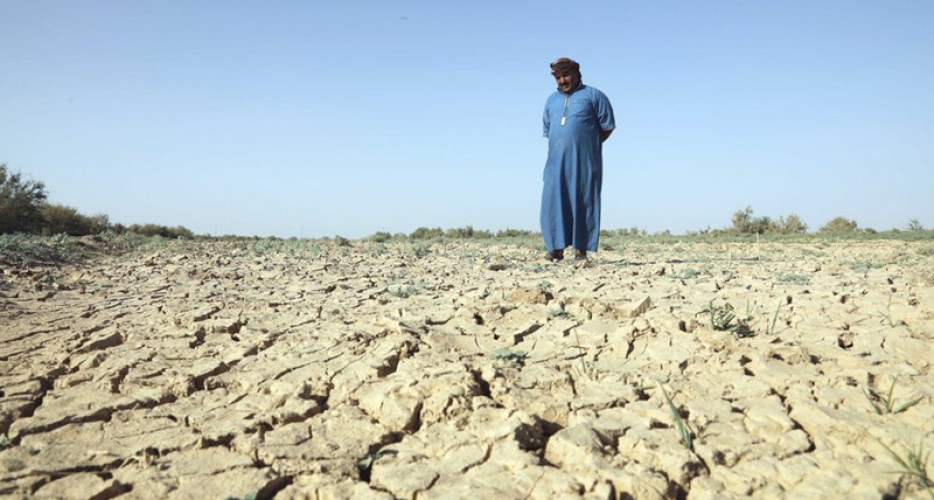Iraq Confronts Worst Water Crisis in 90 Years as Agriculture Loses Half Its Farmland Annually

Peregraf
The Iraqi Ministry of Water Resources announced on Sunday that it had convened an urgent ministerial meeting in Baghdad to confront what officials described as the most severe drought in the country’s modern history. The meeting, which brought together key government ministries, comes amid warnings that climate change and upstream water controls are pushing Iraq toward an unprecedented water and agricultural crisis.
According to a statement from the ministry, the meeting was held at its headquarters on the directive of Prime Minister Mohammed Shia al-Sudani, with the participation of the Ministers of Water Resources, Agriculture, and Environment. It followed discussions at the 38th regular session of the Council of Ministers, where the worsening drought and water shortages were prioritized.
The Minister of Water Resources painted a stark picture, stressing that Iraq is facing “one of the worst water years in more than 90 years.” He explained that water flows in the Tigris and Euphrates rivers have been sharply reduced due to a combination of climate change and the construction of dams and irrigation projects by upstream countries, particularly neighboring Turkey. These developments, the minister said, have devastated water revenues, dam storage, and environmental flows, while also contributing to the alarming rise in salinity levels in the Shatt al-Arab and other southern waterways.
A detailed presentation at the meeting compared Iraq’s current water revenues in 2024–2025 with last year’s levels, assessed the state of dam reservoirs, and examined projections for water storage through November. Officials also reviewed the impacts of salinity on agriculture and drinking water, with particular concern over conditions in Basra, where salt intrusion from the Shatt al-Arab threatens both public health and local livelihoods.
The Water Resources Minister emphasized that securing drinking water and essential human uses remains the ministry’s top priority, alongside maintaining minimum environmental flow requirements.
Environment Minister Halo Askari highlighted another pressing challenge: pollution. He reported that industrial waste and untreated pollutants continue to flow into Iraq’s rivers, worsening water quality and posing direct risks to citizens’ health. He called for a coordinated national plan to regulate pollutants and protect water resources from further degradation.
For his part, Agriculture Minister Abbas Jabr al-Maliki stressed the immense toll the crisis is taking on Iraq’s food security. He revealed that climate change and water scarcity now annually cause the loss of more than 50% of agricultural land due to the decrease in cultivated areas. He described the current situation as “the harshest in years,” adding that adaptation measures are essential.
Al-Maliki urged the rationalization of water consumption, particularly in agriculture, and outlined the ministry’s plan to adopt “smart agriculture” and modern irrigation techniques such as pivot, fixed, and drip systems. He explained that the ministry’s research department is developing and testing seeds capable of withstanding heat and water scarcity. “One of our most important policies is to maintain food security, stabilize prices, and ensure the supply of basic agricultural products,” he said.
The meeting concluded with a set of recommendations to be submitted to the Council of Ministers. Among the most important is the formation of a high-level ministerial team, supported by technical experts, to engage in urgent negotiations with Turkey for increased water releases during October and November. The aim is to secure sufficient flows to mitigate the crisis and prevent further damage to agriculture and the environment.
Beyond the immediate negotiations, the ministers stressed the importance of integrating climate adaptation into Iraq’s long-term water and agricultural strategies. Officials noted that with shrinking arable land and salinity encroaching further inland, Iraq risks not only agricultural decline but also food insecurity and mass displacement from rural areas if urgent action is not taken.
The urgency was underscored by al-Maliki’s remarks at a separate session of the Iraq Investment Forum on Sunday, where he reiterated that more than half of Iraq’s farmland is already being lost each year due to climate-related factors. He emphasized that government efforts to adopt smart agriculture and modern irrigation are not optional but necessary steps to confront the dual threats of drought and climate change.
Experts warn that Iraq’s worsening water scarcity has regional implications, given its dependence on the Tigris and Euphrates rivers, both of which originate outside its borders. Without cooperative frameworks with upstream countries, officials fear that Iraq’s efforts to adapt may fall short.
With 2024–2025 already declared one of the worst water years in nearly a century, the government faces mounting pressure to balance short-term crisis management with long-term resilience planning. For millions of Iraqis, particularly farmers and rural communities, the outcome of these efforts will determine not only livelihoods but also the future of food security in a country already grappling with economic and political challenges.
A Peregraf investigation revealed that the Kurdistan Region—long considered Iraq’s vital reservoir—is now facing severe mismanagement and the rapid depletion of its reserves. Despite government initiatives, mismanagement inside Iraq continues to deepen the crisis. The investigation found that more than 1,650 springs in the Kurdistan Region have dried up, groundwater in Erbil has fallen nearly 500 meters since the 1990s, and reservoirs such as Dukan and Darbandikhan are at critically low levels.
Experts warn that without decisive action, Iraq faces agricultural collapse and irreversible desertification. “If no action is taken, both surface and groundwater are at risk,” said water resources specialist Dr. Abdullah Botani. Analyst Sarmad Latif added, “Iraq now ranks among the lowest globally in water security. The future is bleak unless strategic planning begins immediately.”